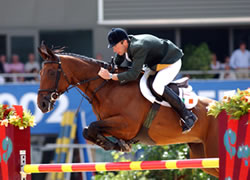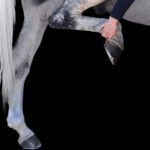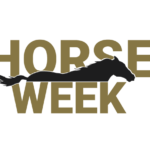
August 9, 2006 — The 2006 FEI World Equestrian Games (WEG) in Aachen will feature reining for the second time. Some of the world’s best reiners will be vying for the medals and a total purse of EUR 100,000. EUR 65,000 will be the prize money for the team competition.
Teams from Austria, Belgium, Brazil, Canada, Czech Republic, Denmark, France, Great Britain, Germany, Israel, Italy, The Netherlands, Switzerland, Slovakia, Sweden and the USA will be competing along with individual riders from the Dominican Republic, Hungary, Mexico, Norway, Poland and South Africa.
Open to six-year-old horses and older, the reining competition will be run in a one go round format and all teams and individuals will perform on the first day. The top 20 competitors–plus ties–will qualify for the clean slate individual competition.
Teams may be made up of three or four riders. For each rider the lowest and highest score awarded by the five judges will be dropped and the three remaining scores will be added. Overall team scores will be determined by dropping the lowest score earned by a team member, then adding the remaining three scores for the total. If a team only has three members, all three scores will be considered.
In order to be able to compete either as a member of a team or as an individual at the 2006 WEG, riders must have taken part in two FEI Reining competitions held in any country during the qualifying period. National federations who wished to send teams must have competed at a CRIO with a team during the same period.
Reining was first competed at the 2002 WEG. Eleven countries were represented with nine full teams: Austria, Brazil, Canada, Germany, Great Britain, Italy, Japan, Switzerland and the USA. Three individual riders–two from France and one from The Netherlands–also showed. Five teams advanced to the finals with Team USA (Shawn Flarida, Scott McCutcheon, Tom McCutheon, Craig Schmersal) taking the gold medal, Team Canada (François Gauthier, Jason Grimshaw, Shawna Sapergia, Patrice St-Onge) claiming silver and Team Italy (Dario Carmignani, Nic Cordioli, Marco Manzi, Adriano Meacci) taking the bronze.
In the individual competition National Reining Horse Association (NRHA) Million Dollar Rider Shawn Flarida (America), riding San Jo Freckles, claimed the gold medal in 2002. The silver medal went to Tom McCutcheon aboard Conquistador Whiz for USA and the bronze medal was awarded to Canadian rider Shawna Sapergia riding Pretty Much Eagle.
How Reining Works
Reining is a judged event designed to showcase the athletic ability of a western type horse in the confines of a show arena. In reining competition, competitors are required to run one of several approved patterns. Each pattern includes small slow circles, large fast circles, flying lead changes, roll backs over the hocks, 360 degree spins done in place, backups and sliding stops. Despite the seemingly relaxed attitude of both horse and rider and the loose reins typical of the discipline, reining is a high level competition sport requiring concentration and high riding competence.
Reiners in Aachen will be performing pattern number eight in the team competition and pattern number nine in the individual competition. The full description of the patterns is available in the FEI Rules for Reining Events.
Horses are judged individually as they complete one of the 10 specified patterns. Judges score each horse between 0 and infinity with 70 denoting an average score. Each horse automatically begins the pattern with a 70. The judge can either add or deduct up to one and a half points on each maneuver, in half-point increments, based on the quality of the maneuver.
Penalties are also allocated for minor deviations from the pattern while major deviations result in a zero score for the go. As the judges watch the execution of the pattern, individual scribes keep track of each judge’s maneuver scores on a score sheet as well as penalty marks. Scores are tabulated and announced at the end of each run. The judge’s sheets with individual maneuver scores, penalties and total scores are then posted after each class.
In scoring, credit is given for smoothness, finesse, attitude, quickness and authority when performing the various maneuvers. Controlled speed in the pattern raises the level of difficulty. An increased level of difficulty is rewarded with higher scores if the maneuvers are performed correctly.
The NHRA states: “To rein a horse is not only to guide him, but to control his every movement.” Unchanged since 1966, that statement serves as the guide to the judging of reining events.
Five international FEI judges will be in the chair in Aachen: Ralf Hesselschwerdt from Germany, Sylvia Katschker from Austria, Jan Boogaerts from Belgium, Patti Carter from Canada and Allen Mitchels from the USA.
Visit EquiSearch.com for in-depth coverage by Nancy Jaffer of the reining competition September 1-3.
Visit EquiSearch’s 2006 WEG section for previews of each discipline.





